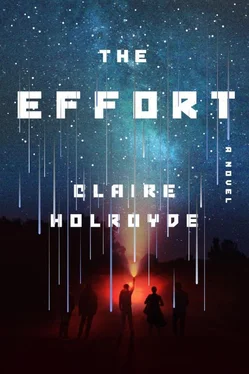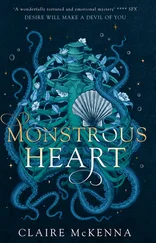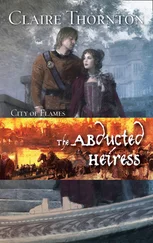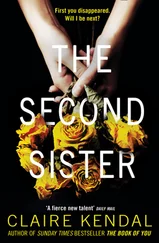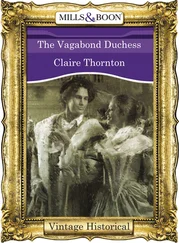“There are large concentrations of schooling fish in these waters,” she assured the both of them. “Walleye pollock, Pacific cod, herring, sablefish. If we can feed ourselves, and maybe a few others through winter, we won’t be too much trouble to take in, right?”
“What if one of us dies before the other?” Jack blurted out.
Maya set the box back down and nuzzled her lover’s ginger-gold beard.
“One of us will die before the other,” she reminded him. “That’s the way of it. Before UD3 and after.”
“After?” he asked with eyebrows lifted. “You mean the international defense effort that was in the news? You think they have a shot?”
Maya waved the question aside. She asked if Jack had ever seen a horseshoe crab. The species was nearly half a million years old. Its ancient self had survived all previous mass extinctions, even the great Permian extinction that had killed up to 96 percent of all marine species.
“So there’s hope?” Jack asked. “Either way?”
Maya looked to the ocean. Primitive life once slithered out and evolved, for better or worse. It could happen again.
“There’s always hope,” she said.
Maya was wiser and stronger than all of Jack’s other lovers, with a rare mix of sweetness and grit. She and Jack were an unlikely match. Only a polar ice cutter and a comet could deliver them into each other’s arms. Jack loved her so much it rendered him speechless.
So he snapped a picture with his camera.
“Pictures?” Maya laughed. “Still?”
“Yes. Still.”
The stories Jack captured with his Nikon made his own life’s story as well. They mattered, still. There was meaning in the making.
“You’ve probably had a lot of survival training, right?” Maya asked.
Jack nodded, frowning. Maya was smart and sensible, but only he could keep them alive. He felt the sweaty fear of being in grave danger beside someone precious; it was a new feeling.
“Have you ever been starving?” Jack asked.
“I’ve been hungry.”
He shook his head: not the same. Something inside Jack cracked. It wasn’t real, but psychosomatic; his scarred body telling him this woman had finally made him fragile.
“We need to find shelter and set up camp,” Jack said. “I know what to do. There’s hope for the two of us as well.”
He stepped back and took a wide-angle shot of Gulp Island, their lodgings for the night. He would continue to capture the human experience for as long as they, and their batteries, could last.
TWENTY-SEVEN
True Soldier of the Wayãpi
Brasília May 24, 2011 National Congress of Brazil
The true soldier fights not because he hates what is in front of him, but because he loves what is behind him.
—G. K. Chesterton
HAVE YOU EVER been surrounded by such a brilliant blue?” Father St. John mused.
The floors and leather upholstery in the Senate chamber were ultramarine, the same blue on the Brazilian flag hanging limp on the stage. The priest looked up from his seat in the upper gallery’s front row to the domed ceiling, which shimmered like fish scales. Father St. John blinked away tears from either too much sunlight or too much beauty in a man-made structure that housed such corrupt men and women. Two out of every three members of Congress faced criminal accusations, ranging from bribery to murder.
“Niemeyer architecture,” the priest whispered in Gustavo’s ear. “One of our own.”
“Our own?”
“Sorry, Brazilian. Niemeyer was born in Rio de Janeiro.”
Gustavo ignored this. The priest was Canadian and Gustavo was a Wayãpi Indian—or an Indigenous person, or whatever name Brazilians were using these days. Both men had lived in the forest and on its dangerous frontier for the majority of their lives. At sixty-eight, Father St. John’s hair and beard were still full but completely gray. He was no longer thin, but that common fat-thin of elderly men with a paunch on which he rested his folded arms. His long, skinny legs were knock-kneed like a curassow bird. Gustavo was in his late forties and had long hair that was still black but without luster.
“Is the list ready?” Gustavo prodded.
Reflections in the priest’s pale irises vanished as he looked back down at Gustavo with something close to pity.
“If I didn’t know you better,” he said, reaching for the leather satchel propped against his sandaled feet, “I’d tell you to enjoy beauty wherever you can find it. But I do know you better.”
Gustavo had met Father St. John, and all the books the priest kept locked away from the forest’s cockroaches, when he was eight years old. An evangelical missionary had sent the boy to find a priest living in a cabin beside a settlement of miners. The missionary wanted Gustavo to be baptized, but Father St. John had no interest in converting a child who didn’t understand the meaning of it. He was not a missionary, but he did have a mission. I heard the cry of my people , he always repeated. The statement was both complicated, for all its many references, and simple. “I Have Heard the Cry of My People” was a letter signed and released by northeastern Brazil’s bishops in 1973, denouncing systemic violations of human rights. It was also a statement attributed to God in the Book of Exodus as he spoke of the oppressed Israelites. Once more, it was Father St. John’s own sentiment since he had left the land of his birth to answer this cry.
“Body count is nine hundred thirteen.” The priest sighed, pulling a stack of papers out of his satchel. “We can’t count missing persons, unfortunately. Only corpses.”
The Walking Dead List supposedly tallied up all the names of activists who pressed for labor rights, Indigenous rights, sustainable farming, and environmental justice—until they were murdered for it. The number was a gross underestimation; the forest had a bad habit of drowning out screams and swallowing up evidence. But the names of those who undoubtedly lost their lives to greed and violence were something that couldn’t be denied.
Gustavo dropped the papers on his lap without a glance. Large numbers still confused him, and he already knew the names of all the brave people reduced to ink on paper. The Walking Dead List existed for those who didn’t know. Gustavo swiveled his head to survey the busy gallery with full seats and bodies packed into the standing room behind them. He had wanted to approach a reporter about publishing the list and wasn’t expecting so many.
“I’ve never seen so many reporters turn out for the forest,” Gustavo remarked.
“They’re here for you ,” the priest insisted.
Father St. John had tried and failed to instill the significance of a Nobel Prize in Literature. Gustavo wasn’t going to attend the award ceremony in Stockholm and chided his friend for being so characteristically optimistic about the stated prize. No one has that much money, Sinjin, he would reply, calling his friend by his family name.
“If the reporters are here for me, then they’re not here for the forest code vote?” Gustavo said.
“Perhaps a few?”
The priest was an optimist, not a liar. Weakening the laws that had governed the forest since 1965 was historic. But the media served the public, and the same public that generally supported the environment in opinion polls also elected the corrupt politicians who fought to exploit and destroy it.
There was a double flash of a camera at the back of the gallery. When Gustavo turned around, another flash blinded him. Father St. John laughed at his puzzled expression.
“Get used to it,” he added.
Teasing Gustavo while teaching him and nudging him toward love, in every Christian sense of the word, were Father St. John’s favorite pastimes.
Читать дальше
